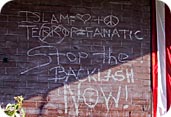 |
|||||||||
|
| home | our mission | contact us | issue archive |

Oct 2001 / church and state :: email this story to a friend

Islamic in St. Louis: Before and After
By Amanda E. DoyleComing to America wasn't exactly what Yasmeena Zivkovic had always imagined it would be.
"We always thought that there would be no prejudice here, that all people would be treated the same" she said, almost wistfully. "Americans themselves are from all over, and I always loved that idea, that this country was made from people from all over the world."
It's a sunny Tuesday morning, exactly two weeks after four commercial airplanes were hijacked, with disastrous results. We are sitting on the sofa in the front room — me in bare feet, Yasmeena in slippers, our shoes lined up near the front door so as not to dirty the rugs where she says salat, or prayers, five times each day — of the tidy little Southside bungalow that Yasmeena shares with her husband. The walls and knick-knack shelves display quotations from the Koran and photos of the hajj, the annual pilgrimage to Mecca that Muslims who are financially and physically able are supposed to make. Yasmeena has invited me here, in part because her home is a comfortable and informal setting for her, the one place she doesn't wear the full head and face coverings (hijab) she believes are demanded of devout Muslim women. She is telling the story of how she arrived in this country from her native Yugoslavia, and how she came to convert to Islam.
Yasmeena and her husband are both from Yugoslavia ("I guess now it is Croatia, but when we left, it was still Yugoslavia"), but lived in Austria when they were first married. The economic situation in their home country drove them to leave in search of work; Yasmeena described the paradox in Yugoslavia: "If you had a college degree, you were an intellectual and would not be able to find a job; if you didn't have an education, you were completely lost."
Austria was unwelcoming, and after experiencing repeated harassment and hostile discrimination, Yasmeena, her husband and their young child came to the United States. They settled in the northeast, living in New Jersey and New York. For Yasmeena, it was a relatively accepting environment.
"There were just so many kinds of people there already that it wasn't a new experience for them to understand people from other countries," she remembered. "There were whites, blacks, Jews, Muslims, and all lived together. I had heard of prejudice between the blacks and the whites, but when I lived in New York, we had a neighborhood called Harlem, and I used to go there all the time with no problem, not being afraid."
Yasmeena's road to Islam began nine years ago, when she was working in a restaurant where the kitchen staff included several Muslim men. (It was one of the careers, along with real estate sales, that she pursued prior to her conversion.) During the month of Ramadan, when Muslims fast from before dawn until after sunset every day, she observed the Muslim cooks laboring for hours behind the hot grills without even breaking the fast for a drink of water. They also didn't take smoke breaks, like a lot of the other workers, including Yasmeena.
"I finally became curious enough to ask them why they did this," she said, "and they told me it was because of their religion, their God. I think to myself, 'Wow, this must be some kind of powerful God!'"
The more she asked questions and read about the Islamic faith, the more she saw it as the answer to her problems. "Before Islam, I had a career, I had my children and my husband, but I was so empty and unsatisfied," she remembered. "Islam gave me the simplicity and peace I was missing." She and her husband converted at the same time, about nine years ago; both had been non-practicing Greek Orthodox before that. Yasmeena's siblings, many of whom she helped bring to America, still think she's nuts, she confides. But her life is now clear to her.
"My life, with God, has a destination," she said. "People can assume what they like, but it's frustrating to me because the way they treat me is based only on how I choose to believe in God."
The Zivkovics have been in St. Louis for about two years, and it has not been an easy transition. Although she thinks the situation is getting better here, as more Muslims arrive and non-Muslim St. Louisans become more familiar with them and their religion, Yasmeena is still disappointed.
"Last week, my husband was walking near the church up the street, where there were a lot of people there for a church service, and three of the men started yelling and chasing him, telling him to go home," she said. "This is our home; I have been a citizen for 23 years. Why can people not mind their own business?"
For her own part, life hasn't changed much since September 11. "Even before this tragedy, I was called names, stared at, like I came from another planet," she said. "To be honest, the tragedy didn't change that much; people are probably even nicer to me now." Yasmeena believes that good can still come from bad, and she hopes that other Americans will take this opportunity to be aware of what goes on in the world around them, that affects them even though it is not always at their front door. "Don't pay attention to pain only when it is in your own house," she advised. "In Islam, we are taught that when you hurt or kill one person, it is like hurting all the humanity; but when you help one person, it is the same as saving all humanity."
What should come next in the current tense climate? Yasmeena hopes that a rush to judgment doesn't throw the very foundations of America out the window. "What happened to the Constitution?" she asked. "Even if bin Laden did this, let them give us proof. That's what they told me when I became a citizen, that we are innocent until proven guilty. If the murderers are Muslims, they are murderers, no question. Even if it's my own son, he is a murderer, even if he is a Muslim."
More than anything, Yasmeena is eager to help others understand her religious faith; it's one reason she covers from head to toe when she leaves the house. She finds it provokes some people to ask her why she is wearing so much covering, giving her a chance to explain her belief in Islam.
"My beauty and my adornments are for my husband," she said. "It is based on some teachings of the Koran, which say basically that a woman is like a pearl, closed in a shell, in the bottom of the sea, and you should not expose her to become like meat on the market. I cover myself so that I can be recognized as a devout Muslim woman, but also to prevent adultery and immorality — there's no way a man can flirt with me, because when I cover, he doesn't know what he's flirting with! I could be fat, I could be ugly...regardless, it is a protection of modesty. I find that I get more respect from men when I go out covered; it's the women that I more often have problems from. There's so much good that comes with that cover." The world could do with a little more modesty, in Yasmeena's opinion; she bemoans modern American society, where "kids often know if mom has a boyfriend and dad has a girlfriend; how can they be expected to be moral when exposed to all that?"
Whatever comes next, Yasmeena is resigned. "I'm not afraid, because my fate is written somewhere already. Whatever happens, Allah knows it and will take care of me."
Church and State | Games | Expatriates | Communities | From the Source
It's All Happening | Young Minds | The Ordinary Eye | Elsewhere
Sights and Sounds | Media Shoegaze | A Day's Work | From the Editor© 2001 The Commonspace
